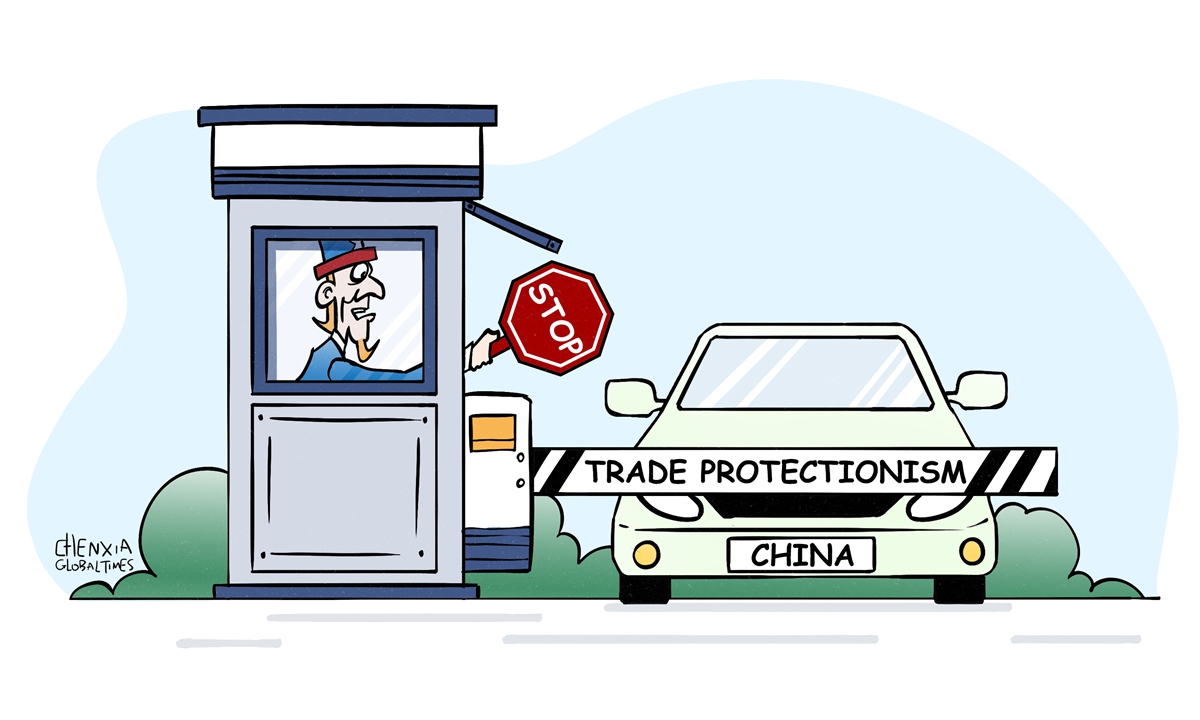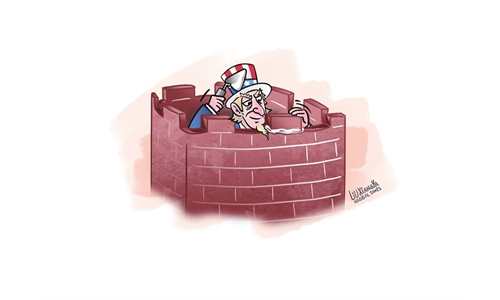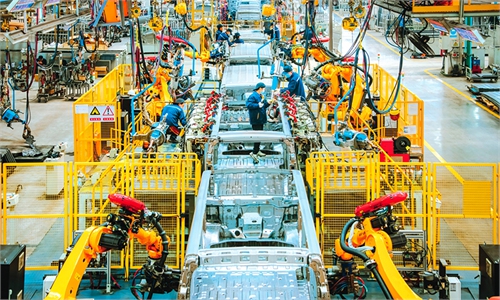
Illustration: Chen Xia/Global Times
The Biden administration moved on Thursday to block Chinese-made electric vehicles from entering the US market, claiming that internet-connected EVs "pose risks to national security" because the vehicles' software systems could send sensitive information of American drivers back to China. Under Biden's direction, the US Commerce Department has commenced a probe into these "security risks," which may lead to new restrictions on import of Chinese EVs.The US government's new policy toward China is driven by trade protectionism, offering the world further evidence of economic bullying and coercion.
The policy is designed to stop low-cost Chinese EVs, whether manufactured in China or assembled by Chinese companies in countries like Mexico, from entering the US and potentially threatening American ICE (internal combustion engine) automakers. Washington also seems to be walking back its transition to a carbon-free economy, despite the Biden administration's claims of leading the world in this direction.
It is okay for US auto companies to take advantage of cheaper labor in Mexico or other countries, but Chinese car companies are criticized for their lower labor costs. What's this logic? Now that China has developed better EV technology, America suddenly feels disadvantaged. It is not about security, just profits for US automakers addicted to assembling gas-guzzling trucks and SUVs. Almost all EVs require internet access for their navigation systems, but Chinese-made cars pose a security risk, so this is just a scare tactic played by Washington to justify protectionist measures.
Chinese enterprises have made significant investments in renewable technology, leading the way in clean, new-energy industrial transformation. Chinese consumers have shown a growing awareness of environmental protection, with over 9.49 million EVs sold in 2023, accounting for nearly 32 percent of all vehicle sales. This stands in stark contrast to the US, where only 1.18 million EVs were sold, making up just 7.6 percent of the market.
As ICE cars decline in China and electric vehicles become more prevalent, major cities like Beijing, Shanghai, and Shenzhen have seen a significant reduction in air pollution. The success of Chinese EVs highlights the country's commitment to sustainable transportation and environmental protection.
The benefits of mass deployment of EVs are obvious. The fierce competition among dozens of Chinese EV makers has driven EV prices constantly down. It is the affordability of Chinese-made EVs that effectively ramps up their market penetration in China, where throngs of consumers are changing their ICE vehicles to EVs. For example, the $11,000 plug-in Seagull brand manufactured by BYD, the world's largest EV manufacturer, has received good reviews and is also affordable for many Chinese and overseas buyers.
Even mainstream US media outlets acclaim China's clean, new-energy vehicle effort. They admit that China has rapidly ratcheted up EV investment, innovation and production in recent years, but China's effort sets it on a collision course with the US government's plan seeking to help lumbering American automakers, the likes of Ford, and GM and Stellantis, dominate the auto market at home and aboard.
But it is problematic for the US government to conjure up the national security issue to protect the "Detroit Three" and keep cheaper and better foreign-made EVs off the road in America.
The Biden administration's use of "national security" is nothing but a cover for trade protectionism, aimed at restricting normal trade and investment in the name of actual national security concerns, which many in the world see clearly as nothing more than an economic smokescreen. The administration is just using national security as an excuse to protect their own political interests, and the highly protectionist and coercive economic policy won't bode well for America in the long run.
The previous Trump administration had already imposed excessive 27.5 percent tariffs on Chinese-made cars, and the Biden administration's latest measure is one more step to restrict competition for EVs that will only cause US consumers to pay more for what they could buy on the US market.
US media outlets revealed that Biden's new measure stemmed from conversations with Detroit automakers, union autoworkers and Tesla. Biden released a statement accompanying the policy announcement, saying "China is determined to dominate the future of the auto market including by using unfair practices. China's policies could flood our market with its vehicles, posing risks to our national security. I'm not going to let that happen on my watch."
But a good number of American consumers don't take the side of their government. They spoke out their disapproval in social media, sarcastically. Two posts read: "Seriously, China is spying on us through their electric vehicles? The paranoid thoughts have deprived us from using Huawei cellphones or flying DJI hobby drones." "Do we want to make electric vehicles affordable for the average American? Or do we want to make sure only the rich can afford electric cars? Stop protecting our automakers that make $70,000 behemoths instead of importing much more useful $20,000 economy cars."
Nevertheless, American automakers will praise "the invisible hand of the market" played by the Biden administration to protect them to continue to churn out large, overpowered and overpriced gas guzzlers. What is actually going on in Washington is the government trying to justify economic protectionism to temporarily protect American automakers. The result is that vast US consumers will pay more for those dirty guzzlers poisoning the air. In a sense, the alleged security threat posed by inexpensive Chinese EVs sounds more like a "security threat" to the stock prices of US automakers which don't see developing and producing low-priced EVs as sufficiently profitable.
As the US presidential election is to be held in the coming November, Donald Trump and Joe Biden are competing to be seen as tougher on China. But the "who's tougher battle" or political pandering is hurting broadly American consumers' pocketbooks and the environment.
The author is an editor with the Global Times. bizopinion@globaltimes.com.cn



